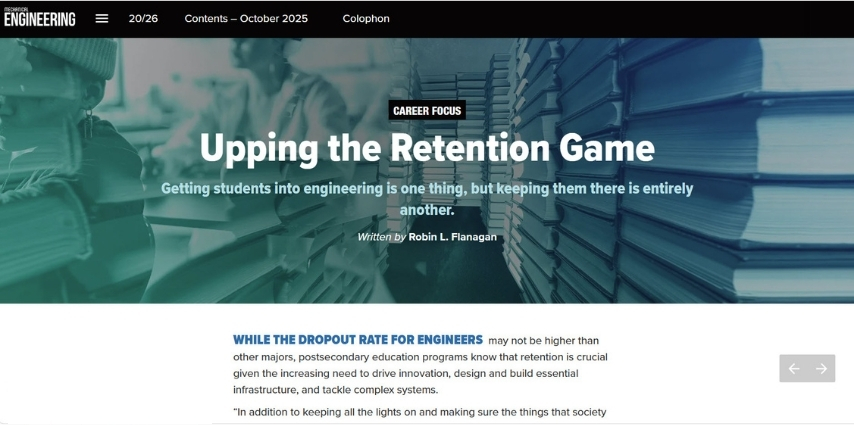Women in ME: A Bright Future with Emphasis on People Skills
Women in ME: A Bright Future with Emphasis on People Skills


Women remain significantly underrepresented in mechanical engineering, but those in the sector could do well through foundational expertise, soft skill know-how, and networking.
Women remain significantly underrepresented in mechanical engineering, though there are signs of gradual improvement. In 2022, just 17.3 percent of bachelor’s degrees in mechanical engineering were awarded to women. Of all women engineers in that same year, 9.3 percent were mechanical engineers.
The forward trend for mechanical engineering, including women engineers, appears to be bright. And that might just be because, in part, mechanical engineers have strong foundational expertise and are better able to adapt that knowledge to growing sectors of the economy.
Sam Wright, head of partnerships and operations at Huntr.co in Seattle, Wash., cited its “Q2 2025 Job Search Trends Report,” which analyzed 285,000 job postings. The report found that mechanical engineering is a lucrative field with increasing demand for graduates.
“Interestingly, mechanical engineering has seen a significant surge in demand from employers, ranking as the number one fastest-growing field of study in terms of job requirements in the first half of 2025, with a market share growth of nearly 38 percent,” Wright said.
“The data shows this demand is not just from traditional manufacturing sectors. We’re seeing industries like product management and even uncategorized tech roles list mechanical engineering as a top desired degree,” he explained. “This suggests that the analytical, problem-solving skills inherent to the discipline are being highly valued across a diverse range of tech and business sectors, creating new pathways for mechanical engineers outside of traditional industrial roles.”
Of those women who pursue mechanical engineering, many are entering new and different fields such as product management. Employers are seeking women mechanical engineers not just for pure technical positions but are recruiting for positions that require analytical skills where a deeper learning of complex topics is required.
For women who pursue a career in engineering, career enhancement is achieved in many ways—one of which is robust networking. Daniella Wahler, principal with PAE Engineers in Seattle, Wash., and a working mechanical engineer who graduated from the University of Colorado at Boulder in 2007, explained, “One of the most important things you can do early in your career is to adopt a ‘give mode’ mindset.”
What this means is “contributing generously to your work and focusing on building strong relationships. This investment pays off later when life demands more flexibility (like needing coverage while caring for a sick kiddo home from school),” she explained. “Women looking to get into engineering should invest time in mentor relationships; it can help women grow at every stage of their careers. When looking for a mentor, seek diverse perspectives, including male mentors. The broader the viewpoints you’re exposed to, the greater your potential for growth.”
 Whaler further emphasized the value of connections as a key part of any woman’s strategy when pursuing a mechanical engineering career. “Creating meaningful connections is critical to growing in this industry, and ultimately, it’s about the people,” Wahler emphasized. “The contractors, owners, architects, and design team all have a common goal. No one is there for a ‘one-and-done’ project, and cultivating relationships is at the center of what makes for a fulfilling experience.”
Whaler further emphasized the value of connections as a key part of any woman’s strategy when pursuing a mechanical engineering career. “Creating meaningful connections is critical to growing in this industry, and ultimately, it’s about the people,” Wahler emphasized. “The contractors, owners, architects, and design team all have a common goal. No one is there for a ‘one-and-done’ project, and cultivating relationships is at the center of what makes for a fulfilling experience.”
Like many careers and professions, there’s an initial importance placed on certain technical skills. For example, how well versed is a candidate in say modeling and simulation? Do they have a quest to learn about things such as complex systems, engines, and designing things?
But what’s also critical, and often given less attention, is a candidate’s ability to communicate well and interact with others. Many, if not most, mechanical engineers will work on cross-functional teams, where interpersonal skills are key to project success.
Wahler said that creating meaningful connections is critical to growing in this industry, and ultimately, it’s about the people. Women engineers who are able to leverage their mastery of communication, leadership, and negotiation will do well to add these skills to their foundational knowledge.
Jim Romeo is a technology writer in Chesapeake, Va.
The forward trend for mechanical engineering, including women engineers, appears to be bright. And that might just be because, in part, mechanical engineers have strong foundational expertise and are better able to adapt that knowledge to growing sectors of the economy.
Opportunities of nontraditional sectors
Sam Wright, head of partnerships and operations at Huntr.co in Seattle, Wash., cited its “Q2 2025 Job Search Trends Report,” which analyzed 285,000 job postings. The report found that mechanical engineering is a lucrative field with increasing demand for graduates.“Interestingly, mechanical engineering has seen a significant surge in demand from employers, ranking as the number one fastest-growing field of study in terms of job requirements in the first half of 2025, with a market share growth of nearly 38 percent,” Wright said.
“The data shows this demand is not just from traditional manufacturing sectors. We’re seeing industries like product management and even uncategorized tech roles list mechanical engineering as a top desired degree,” he explained. “This suggests that the analytical, problem-solving skills inherent to the discipline are being highly valued across a diverse range of tech and business sectors, creating new pathways for mechanical engineers outside of traditional industrial roles.”
Of those women who pursue mechanical engineering, many are entering new and different fields such as product management. Employers are seeking women mechanical engineers not just for pure technical positions but are recruiting for positions that require analytical skills where a deeper learning of complex topics is required.
Networking for women engineers
For women who pursue a career in engineering, career enhancement is achieved in many ways—one of which is robust networking. Daniella Wahler, principal with PAE Engineers in Seattle, Wash., and a working mechanical engineer who graduated from the University of Colorado at Boulder in 2007, explained, “One of the most important things you can do early in your career is to adopt a ‘give mode’ mindset.” What this means is “contributing generously to your work and focusing on building strong relationships. This investment pays off later when life demands more flexibility (like needing coverage while caring for a sick kiddo home from school),” she explained. “Women looking to get into engineering should invest time in mentor relationships; it can help women grow at every stage of their careers. When looking for a mentor, seek diverse perspectives, including male mentors. The broader the viewpoints you’re exposed to, the greater your potential for growth.”

Upping the Retention Game
Getting students into engineering is one thing but keeping them there is entirely another.
Like many careers and professions, there’s an initial importance placed on certain technical skills. For example, how well versed is a candidate in say modeling and simulation? Do they have a quest to learn about things such as complex systems, engines, and designing things?
But what’s also critical, and often given less attention, is a candidate’s ability to communicate well and interact with others. Many, if not most, mechanical engineers will work on cross-functional teams, where interpersonal skills are key to project success.
Wahler said that creating meaningful connections is critical to growing in this industry, and ultimately, it’s about the people. Women engineers who are able to leverage their mastery of communication, leadership, and negotiation will do well to add these skills to their foundational knowledge.
Jim Romeo is a technology writer in Chesapeake, Va.





